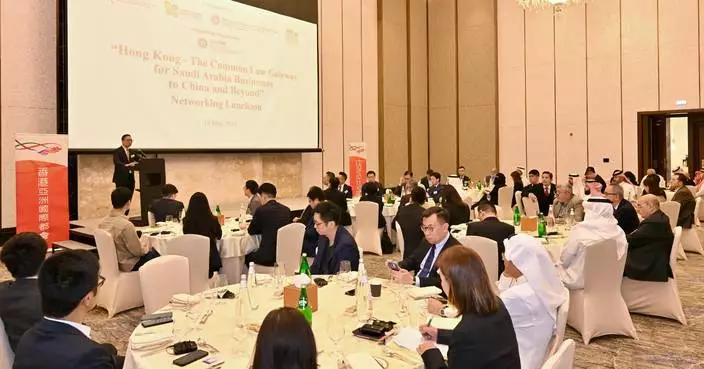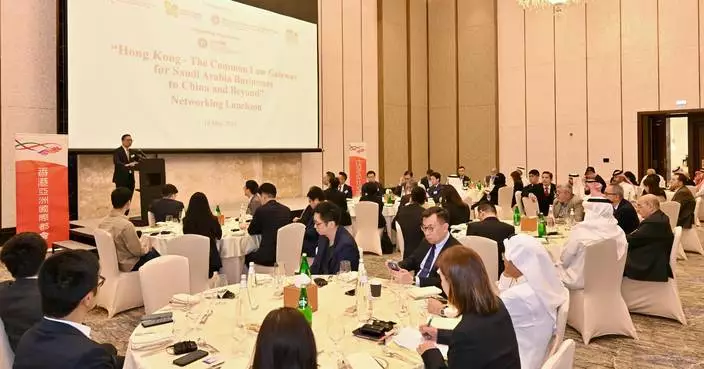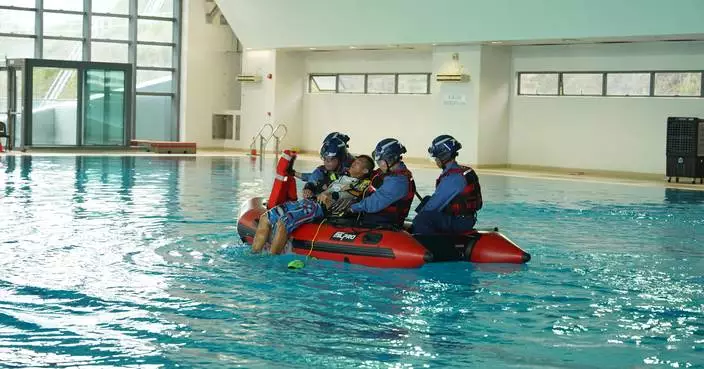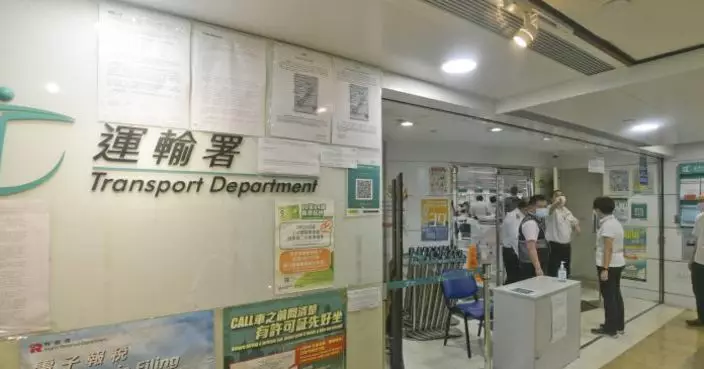Unlocking the potential of kowloon east: lcq19 development plans
Following is a question by the Hon Tang Ka-piu and a written reply by the Secretary for Development, Ms Bernadette Linn, in the Legislative Council today (May 8):
Question:
The 2011-2012 Policy Address put forward the Energizing Kowloon East initiative, which aims to transform Kowloon East (KE) into the second core business district (CBD2) through the development of the office belt and tourism and leisure facilities at Kai Tak as well as the revitalisation of industrial buildings. In this connection, will the Government inform this Council:
(1) of the numbers and gross floor areas (GFAs) of (i) industrial buildings, (ii) commercial buildings (broken down into (a) Grade A offices, (b) Grade B offices and (c) other office sub-sectors), and (iii) business buildings providing accommodation for a mix of industrial and commercial uses in CBD2, and set out in Table 1 a breakdown by age of the building (i.e. (I) 0 to 10 years, (II) 11 to 20 years, (III) 21 to 30 years, (IV) 31 to 40 years, (V) 41 to 50 years and (VI) 51 years or above);
Table 1
Use of building
Age of building
Number of building
GFA
(i)
(I)
……
(VI)
(ii)
(a)
(I)
……
(VI)
(b)
(I)
……
(VI)
(c)
(I)
……
(VI)
(iii)
(I)
……
(VI)
(2) among the applications received by the Government for the new round of the revitalisation scheme for industrial buildings launched in 2018, of the respective numbers of applications involving industrial buildings in CBD2 that were approved and rejected, and the reasons for the rejection of the applications;
(3) whether it has compiled statistics on the numbers and areas of sites in CBD2 which are currently (i) idle sites for which no development plan has been finalised and (ii) sites for temporary use only with no long-term development plan, and set out in Table 2 a breakdown by landowner (i.e. (a) the Government and (b) the private sector);
Table 2
Type of site
Landowner
Number of sites
Site area
(i)
(a)
(b)
(ii)
(a)
(b)
(4) of the respective numbers and floor areas of the properties (i) owned and (ii) rented by the Government in CBD2, and set out in Table 3 a breakdown by use of the property (i.e. (a) district service centres of government departments, (b) headquarters of government departments, and (c) others);
Table 3
Property owned/rented by the Government
Use
Number of properties
Floor area
(i)
(a)
(b)
(c)
Total
(ii)
(a)
(b)
(c)
Total
(5) whether it has compiled statistics on the numbers of companies in (i) innovation and technology (I&T), (ii) culture, (iii) sports, (iv) tourism and (v) other industries (a) operating business and (b) headquartered in CBD2, and the numbers of jobs provided by such companies and their gross output, with a breakdown as set out in Table 4; and
Table 4
Industry of company
Operating business/setting up headquarters
Number of companies
Number of jobs provided
Gross output
(i)
(a)
(b)
……
(a)
(b)
(v)
(a)
(b)
(6) given that in reply to my question on July 5 last year, the Government indicated that KE has the potential to promote I&T and arts, culture and creative industries given its historical background in industrial development and the ambience of cultural workers moving in one after another in recent years, whether the authorities have plans to further promote the development of the industries of I&T, culture, sports and tourism in KE, and to develop KE into a "city of entrepreneurship" for the aforesaid industries; if so, of the specific measures; if not, the reasons for that?
Reply:
President,
The Government promulgated the Energizing Kowloon East initiatives in 2011, with the objectives to transform Kowloon East comprising the Kai Tak Development Area, the Kwun Tong Business Area and the Kowloon Bay Business Area into Hong Kong's second core business district (CBD2) and to ensure a steady supply of quality office space in support of the economic growth of Hong Kong and strengthening Hong Kong's global competitiveness. In 2017, relevant initiatives including enhancing connectivity and improving the environment, etc, have been extended to the San Po Kong Business Area. Since 2011, the commercial gross floor area (GFA) in Kowloon East has increased by a double to currently about 3.4 million square metre.
After consultation with the relevant policy bureaux and departments, the replies to the various parts of the question raised by the Member are as follows:
(1) The statistics on the commercial, industrial and industrial/office developments in Kowloon East (i.e. the Kai Tak Development Area, Kwun Tong Business Area and Kowloon Bay Business Area) by building age are as follows:
Uses
Building age
Numbers*
GFA
Commercial#
0-10 years
56
About 1 500 000 sq m
11-20 years
35
About 1 300 000 sq m
21-30 years
8
About 400 000 sq m
31-40 years
6
About 200 000 sq m
Industrial
0-10 years
7
About 60 000 sq m
11-20 years
2
About 20 000 sq m
21-30 years
17
About 300 000 sq m
31-40 years
68
About 1 700 000 sq m
41-50 years
67
About 1 000 000 sq m
51 years or above
77
About 700 000 sq m
Industrial/Office
11-20 years
1
About 10 000 sq m
21-30 years
10
About 200 000 sq m
* as at December 2023.
# including new developments, redevelopments and converted commercial buildings in Kowloon East (i.e. Kai Tak Development Area, Kwun Tong Business Area and Kowloon Bay Business Area), but excluding the commercial portions of residential/commercial developments in the Kai Tak Development. We do not have relevant information by grading of commercial developments.
(2) Another round of revitalisation scheme for industrial buildings was promulgated in 2018. It includes to allow relaxation of the maximum permissible plot ratio by up to 20 per cent for industrial redevelopment sites located outside "Residential" zones in main urban areas and new towns, for which the modified lease should be executed after the town planning approval to put the relaxed plot ratio into effect (redevelopment of industrial buildings); and to exempt the waiver fees incurred for wholesale conversion of industrial buildings aged 15 years or above in "Commercial", "Other Specified Uses" annotated "Business" and "Industrial" zones into permissible planning uses on the condition that the applicants should designate 10 per cent of the floor area for specific uses prescribed by the Government upon completion of such conversion works (wholesale conversion of industrial buildings).
As at the end of March 2024, the Town Planning Board has received and approved 23 applications for redevelopment of industrial buildings within the CBD2 with relaxation of the maximum permissible plot ratio (excluding applications withdrawn by the applicant and applications involving the same site). For those industrial redevelopment projects requiring lease modification, the Lands Department has received eight applications for lease modification (excluding applications withdrawn by the applicant), of which seven cases have been approved with the lease modifications completed while the remaining one case is still under processing. Regarding wholesale conversion of industrial buildings, as at the end of March 2024, the Lands Department has received one application (excluding applications withdrawn by the applicant) for special waiver for industrial buildings within CBD2 and the application has been approved.
(3) Relevant details of government sites which have been formed and pending the implementation of planned commercial uses in Kowloon East are as follows:
Location
Number of sites
Site area
Kai Tak Development Area
3
About 7.8 ha
Kowloon Bay Action Area
To be determined
About 3.4 ha
All the above mentioned sites are being put to temporary use at present. We do not have information on the construction timetable of the private lands.
(4) According to the information provided by the Government Property Agency (Agency), the number and the floor area of government-owned properties located within private developments under the management of the Agency and private properties leased via the Agency in Kowloon East (Kai Tak Development Area, Kwun Tong Business Area and Kowloon Bay Business Area) are as follows.
Type of property
Number
Internal floor area
Government-owned properties
Involving individual premises in one building
About 6 600 sq m
Leased properties
Involving 141 leases
About 104 000 sq m
(Note: The Agency has no statistics on the usage of the properties for district service centre or headquarters by government departments.)
Apart from the above properties within private developments, the Government possesses various kinds of facilities and specialised buildings, some of which are used as Government offices, such as Electrical and Mechanical Services Department Headquarters Building, Inland Revenue Centre and Trade and Industry Tower in Kai Tak; Water Supplies Department Kowloon East Regional Building and Central Mail Centre in Kowloon Bay; and Kowloon East Government Offices and Energizing Kowloon East Office in Kwun Tong etc.
(5) According to the Survey on Business Establishments in Kowloon East 2018, the distribution of the establishments by industry within the scope of survey (i.e. the Kwun Tong Business Area and the Kowloon Bay Business Area) is shown in the following table:
Industry
No. of establishments
Percentage of total establishments in Kowloon East (%)
Head office
Non-head office
Manufacturing
3 481
314
14.0
Construction
1 933
98
7.5
Import/export, wholesale and retail trades
9 342
1 282
39.2
Restaurants and hotels
177
29
0.8
Transportation, storage and logistics
890
206
4.0
Telecommunications services and information technology services
1 234
128
5.0
Banking and financial services and insurance
1 950
267
8.2
Real estate and professional and business services
2 682
182
10.6
Publishing, media and multi-media and creative and performing arts activities and specialised design activities
1 363
85
5.3
Healthcare services, and research and development on natural sciences
204
42
0.9
Social and personal services
1 063
117
4.3
Waste management
67
1
0.3
(Note: The above categorisation of industries is in accordance with the Hong Kong Standard Industrial Classification promulgated by the Census and Statistics Department. The survey does not cover the number of jobs created by the respective companies and their gross output. The Energizing Kowloon East Office is conducting another round of survey on business establishments in Kowloon East.)
(6) The Government has been introducing related policies in Kowloon East in a timely manner to meet the need of Hong Kong in the time of economic transition. Kowloon East used to be an important industrial base in the heyday of manufacturing industry in Hong Kong. In view of the relocation of Hong Kong's manufacturing industry to the mainland, industrial land in Kowloon Bay and Kwun Tong have been rezoned to "Business" use which allowed conversion of industrial buildings to office use and redevelopment into commercial/office buildings under the planning regime. Subsequently, the Government introduced two rounds of revitalisation scheme for industrial buildings to facilitate the redevelopment and wholesale conversion of industrial buildings, followed by the introduction of the scheme to charge land premium at standard rates for lease modifications of redevelopment of industrial buildings to encourage revitalisation of industrial building. A number of industrial buildings in Kowloon East have been or will be redeveloped or converted into office, shop and services and hotel uses. Besides, to ensure a steady and adequate supply of quality office space in Kowloon East, the Government has disposed eight pieces of government land in Kowloon East for commercial development since the promulgation of the Energizing Kowloon East initiatives. Flexibility has been allowed in the planning of these commercial sites for the establishment of innovation and technology uses.
Against this context and driven by a series of policy measures, Kowloon East has been transformed into CBD2 with a diversity of industries. In terms of the supply of commercial properties, apart from Grade A office, there are different types of affordable properties of good quality which provide space for developing business by different types of companies. Notwithstanding that the Government has no plan to designate particular site in Kowloon East for innovation and technology use, or to deploy specific measures to promote innovation and technology in Kowloon East, with the unique history of the area, diversified supply of properties especially that manufacturing activities are still active in the area, innovation and technology companies would be convenient in pairing up with the research, academic and industry sectors or other businesses supporting services, while the converted industrial buildings in the area with relatively lower rent would be attractive to startups. These would attract innovation and technology companies to move into Kowloon East. In fact, a number of innovation and technology startups have gradually been stationed in Kowloon East in recent years.
Besides, the Energizing Kowloon East Office (the Office) has been collaborating with private and public sectors to utilise Kowloon East as a Smart City Lab. For example, an indoor-outdoor navigation with voice guidance for the visually impaired/people in needs at MTR stations and some large shopping malls in Kowloon East has recently been introduced under the facilitation of the Office. Others include a proof of-concept trial at the Kwun Tong Typhoon Shelter on Real-time Water Quality Monitoring System completed earlier on and an ongoing trial of Smart Recycling Systems. At the same time, the Office would assist and facilitate different groups in organising promotional activities on smart city development and STEM as means to facilitate the development of innovation and technology.
Regarding culture, sports and tourism development aspects, the Culture, Sports and Tourism Bureau will fully utilise the opportunities brought by the Kai Tak Sports Park (KTSP), East Kowloon Cultural Centre and Kai Tak Cruise Terminal, and their collaboration with other facilities in the district, to develop culture, sports and tourism as well as bring new experiences to visiting tourists. As an incubator for the development of arts and technology, the East Kowloon Cultural Centre which is adjacent to Kowloon East CBD2 will bring new cultural experience to the community. Whereas for KTSP, it will provide venues for hosting mega sports and entertainment events, thereby giving impetus to the development of relevant sectors.

Source: AI-generated images
Unlocking opportunities: how hong kong's common law can propel saudi businesses into the chinese market and beyond
Following is the speech by the Secretary for Justice, Mr Paul Lam, SC, at the lunch and networking reception titled "Hong Kong - The Common Law Gateway for Saudi Arabia Businesses to China and Beyond" in Riyadh, Saudi Arabia, today (May 19, Riyadh time):
Distinguished guests, ladies and gentlemen,
Firstly I would like to express my gratitude and to welcome all of you to this networking luncheon organised by the Department of Justice together with other organisations as the MC has just said. I wish just to take the opportunity to say a few things to explain why we are here and what we need to achieve. But let me begin by making one very important point: today's lunch has a very special meaning to me and to my delegation from Hong Kong because there are many "firsts".
This is the first time I lead a delegation consisting of lawyers and members from other business sectors on an overseas trip after I became the Secretary for Justice in July 2022. This is the first "first". The second "first" is that as to this particular trip to the Middle East, Saudi Arabia is our first destination. So that our first destination is the second "first". The third "first" is that we just arrived this morning around 3am, some arrived a little later at 4am or 5am. And this particular lunch is in fact the first event for the whole trip including that in Saudi Arabia. So it is going to be very memorable. As there is a Chinese saying, because we have a lot of friends coming from the Mainland China, a good beginning means 50 per cent of your success. So I am truly very honoured and very pleased to see so many guests from Saudi Arabia and also representatives of enterprises, organisations from Mainland China in Saudi Arabia and to come here to join this lunch.
Now coming to the purpose of this lunch, and perhaps this trip. Obviously, as the minister of justice of Hong Kong, I am trying to tell you a little bit more about the legal service in Hong Kong, what we can offer, but, more importantly, we have to start by making friends. We have to start by building personal relationship. In order to build a personal relationship, the very first thing we need to do is to introduce ourselves.
My delegation consists of, I don't remember the exact number, but probably maybe around 40 including all my supporting staff. Now the combination is quite unique. Firstly, we have people coming from the Government, not just from the Department of Justice in which I am working, I am joined by representatives of Invest Hong Kong which is a branch of the Government responsible for promoting investment, colleagues coming from the ETO (Hong Kong Economic and Trade Office) all the way from Dubai, for they are responsible for promoting trade around the world. And then we have representatives from the Hong Kong Trade Development Council which is a statutory body also responsible for promoting trade. So we have numerous organisations trying to work together to enhance Hong Kong's relationship with other jurisdictions.
Apart from representatives coming from the Government, we have very strong representatives from the private sector. We have more than around say 15 lawyers who are really the top lawyers in Hong Kong. They specialise in doing both contentious and also non-contention business. We have experts doing IPOs (initial public offerings), M&A (mergers and acquisitions), and we also have experts in arbitration or litigation. So we have whole spectrum of legal eagles in this room. And on top of that, I have also invited representatives from the Hong Kong Stock Exchange and Hong Kong International Arbitration Centre to be here.
Now you may wonder why instead of simply asking my colleagues to come here, which is much easier to organise this trip, why I have invited so many friends to come here. The reason is very simple, because I wish to demonstrate to people, our friends in Saudi Arabia, that Hong Kong is really an ideal place to provide one-stop professional legal service from the time you think of setting up a business in Hong Kong for exploring opportunities in Mainland China, up to the very end when unfortunately some disputes arise, and then you have to consider where and how to resolve the disputes. We offer a sort of packaged professional services from the very beginning until the very end. And the representatives of this delegation, they are experts at different stages of these whole business cycle, so to speak.
Now, maybe you have noticed that we have a theme for the talk, and in fact, that is also the theme I am going to use throughout my trip. It goes something like "Hong Kong - The Common Law Gateway for Saudi Arabia Businesses to China and Beyond". I think "gateway" simply symbolised the fact that Hong Kong is playing a very important role of connecting Saudi Arabia and the Middle East with not just Hong Kong itself. Hong Kong is not just a destination, it is also a springboard or place that can take you to other parts of China so that you can explore opportunities in the whole country.
Now, what is perhaps a little bit unusual is that I have deliberately add the word "common law" before the word "gateway". And here comes the important point, because as the person responsible for promoting legal services in Hong Kong, this is really the point that I wish to emphasise at this lunch. Now, why is this so important? Why is it of interest to friends in Saudi Arabia?
To answer the question, perhaps I have to step back and talk a little bit about the history of Hong Kong. I am sure most of you would be aware of what I am going to say, but it is worth repeating now. I am sure that those of you would be aware of the fact that Hong Kong used to be ruled by the British for more than 100 years between 1842 until June 30, 1997. Now, the important thing is that during this period of British rule, the British introduced the common law system to Hong Kong and that common law system developing for a century has become extremely reputable and well-established. And what happened on July 1, 1997 is that China resumed sovereignty of Hong Kong. China decided to resume sovereignty in a very unique manner which was unprecedented in human history, that is by introducing the concept or principle of "one country, two systems", which means that Hong Kong shall maintain and preserve its common law system. So we are still using the common law system in Hong Kong, which is entirely different from the civil law system used in other parts of China.
You may then ask: why is the common law system so significant? How is it relevant to your business or investment interests? Now, I wish to highlight four important characteristics perhaps we ought to bear in mind.
The first characteristic that I wish to stress is that we have a very trustworthy, very credible, very reliable and reputable judicial system. Under the mini-constitution of Hong Kong, which is called the Basic Law of Hong Kong, the courts of Hong Kong enjoy independent power of adjudication, including the Court of Final Appeal in the power of final adjudication. That means in every litigation of court proceedings in Hong Kong, it always ends in Hong Kong, it never goes beyond Hong Kong.
And a very special feature that is also worth mentioning is that in our Court of Final Appeal, which is the highest court in Hong Kong, we have invited at the moment 10 overseas judges, very eminent retired judges from other jurisdictions, to sit as our part time judges. A very recent appointment is a retired federal judge from Australia. We also have retired judges from England, from Australia, from Canada. Before their retirement, they used to be the chief justice of their respective jurisdiction. And I think that firstly it is a vote of confidence of judges from other jurisdictions in the legal system of Hong Kong. And secondly, it is a symbol and the indication of the quality of justice that the Hong Kong judicial system can offer. So this is my first point.
The second point is that the Hong Kong legal system offers a very secure and safe regulatory system to safeguard your financial interests. Under our Basic Law, which a constitutional document, we guarantee private property right. So no one can expropriate your property, not even the government under no circumstances can they take away your property at their own discretion. And then free flow of capital is guaranteed. Money can come in Hong Kong and leave Hong Kong freely. So it is a very, very friendly environment for funds to move in and to move out. But at the same time, we also have a very strict regulatory framework to ensure that misconduct or malpractices will not be permitted. So this is to strike a balance to ensure free flow of capital and at the same time to ensure that your money, your investments and financial interests will be sufficiently protected.
The other thing is that when it comes to law enforcement, Hong Kong is regarded as one of the cleanest place in Hong Kong. So corruption or other sort of malpractice that might exist in some other places in the world is not an issue in Hong Kong. So putting aside a similar framework in practice, it's applied and enforced very straightly and properly.
So then go to my third point. My third point is that our legal system is extremely business friendly. Business friendly in the sense that the content of our law is extremely similar to the civil and commercial law that we found in most other countries, in particular in the western world, say the United States and the UK and western Europe. And the simple reason is because of the common law tradition that I have mentioned. Most of our civil and commercial law, for example company law and contract law, the content is almost identical to what you may have in England, Australia and New Zealand. So the important thing is that our set of law is extremely familiar to the international business community. But at the same time, apart from maintaining our tradition, we try to ensure that our law will be updated to meet the new demands. So very recently we have introduced a new legislation to encourage people to set up, for example, family office in Hong Kong by providing tax advantages. And there are also other measures to ensure that we can provide a very attractive environment at the same time to give you the sort of protection that you deserve. Ms Alpha Lau, the Director-General of Invest Hong Kong, is going to speak after me. I am sure that she can provide more details in this respect.
But apart from the substantive law, what is equally important is that we have a very strong pool of legal talent in Hong Kong. I mentioned earlier that more than 15 lawyers come with me and that by itself is an evidence on the strength of the legal profession. We have a divided legal profession in Hong Kong consisting of barristers and solicitors. Barristers are specialists in doing contentious business. They go to court most of the time, they also take part in arbitration and mediation. And then the solicitors, they are more general in practice. They will be responsible for non-contentious matters, say M&A, IPO, providing advisory work, so on and so forth. So what I wish to emphasise is that we have a big pool of top-quality professionals who stand ready to serve your interests. And one thing that we must bear in mind is that most of these legal professionals are bilingual, many of us are Chinese, of course we have a lot of expatriates. Because of the unique situation in Hong Kong, apart from being very familiar with the international legal community, we are also extremely familiar with how things are done in Mainland China, both the culture and the business environment. So I think that is also an advantage that would work in your interests.
Now the fourth point that I would like to mention about our legal system is that it provides very close connection to both Mainland China and other parts of the world. Now firstly, in particular, I would like to speak on how Hong Kong's legal system is connected to the Mainland because this is a feature that cannot be copied or found elsewhere. I said earlier on that under the principle of "one country, two systems", Hong Kong's legal system is different or separate from that of the Mainland, but it doesn't mean that there is no connection between the two legal systems within the same country. Quite the contrary, we have at the moment nine mutual legal assistance arrangements that connect the two jurisdictions together. And these connections, based on the mutual legal assistance agreements are of great significance to safeguard the interest of investors and businessmen from overseas. I can give you a very simple example. Based on some of the arrangements that I mentioned, a court judgment in Hong Kong for an arbitral award in Hong Kong can be recognised and enforced in the Mainland. So if your business partner is in Mainland China, your assets there that you have to protect, but you wish to take advantage of Hong Kong legal system because you have confidence in our legal system, then Hong Kong is the right choice. You can use our legal system, but you can enjoy the fruit of success of the legal process in Mainland China. Now these legal arrangements are unique to Hong Kong. It is only made possible because of the "one country, two systems" arrangement. So if you go to places like, just as an example Singapore or other places, then you will not find exactly this same sort of co-operation, arrangement or convenience.
So putting these four characteristics together, I would have thought that you will be convinced to a certain degree that Hong Kong is definitely a place for you to consider to act as a platform, a connector, a springboard for you to go into the market in Mainland China and beyond. I said "beyond" because we are all aware of the development and relationship between Middle East and China, including in particular the relationship between Saudi Arabia and China. We have very long friendship going back for more than 1 000 years. Of course I am referring to the Silk Road. But I note that in June 2023, last year, your investment minister said in a very important conference that there would be a modern silk road between Arab countries, including of course, Saudi Arabia, and China. So "silk road" is not something belonging to history. It is not about the past. It is also about our common future. So Hong Kong plays a very significant role in fostering a better relationship between the two countries because of the unique characteristics offered by "one country, two systems".
And as you may note, last February the Chief Executive of Hong Kong came here with a strong delegation, I remember it's almost 100 persons from different sectors. A lot of agreements have been signed, and a lot of initiatives. And after that, many colleagues from the Government in different areas have come to Saudi Arabia. So it is now my turn, basically. And we are talking about setting up an ETO, economic and trade office, in Saudi Arabia in Riyadh. I hope it will come into reality soon. But the future is very clear, the direction is very clear. I am very confident and I hope that you are equally confident that the relationship between Saudi Arabia and Hong Kong is going to be very strong and much closer than today. But it requires some efforts. So I am sure that each and every one of us in this room can make some contributions to make what we have in mind to come true as soon as possible. It is a bit a pity that we only have about two hours or so at this lunch to make friends, to talk about things of common interests. It may be a very small step in the overall scheme of things, but I do believe that this is the small step that will take us closer to our final destination.
So lastly, I wish you all a very enjoyable lunch. I hope we can make some friends and enhance our relationship. If you have any question on Hong Kong, I am sure that my friends from Hong Kong sitting at the table will be more than happy to entertain all the questions. And I am very confident that they will have good answers. And obviously, we are also very interested to hear from you about your situation in Saudi Arabia. I think to make friends, we have to know each other first. So thank you very much.

Speech by SJ at lunch and networking reception titled "Hong Kong - The Common Law Gateway for Saudi Arabia Businesses to China and Beyond" in Riyadh, Saudi Arabia Source: HKSAR Government Press Releases










